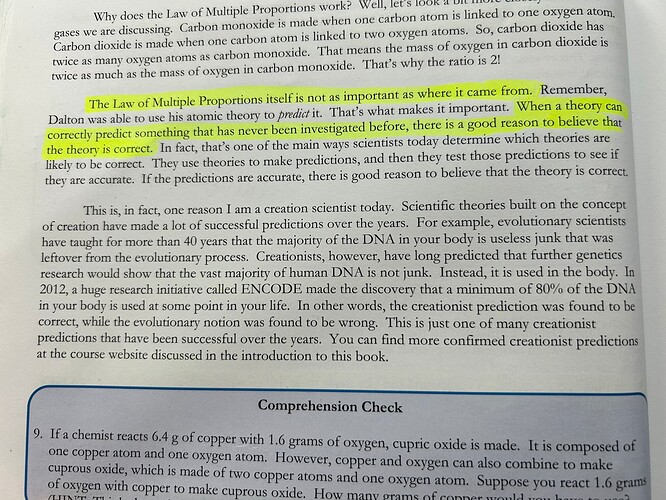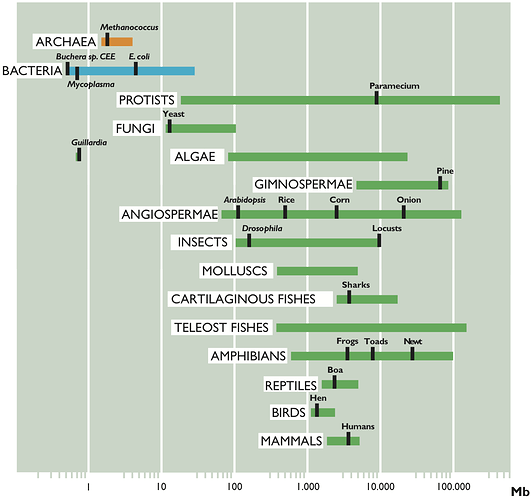This section was in my daughter’s science book, and I was unsure of how to engage with it. Would it be an appropriate response to say that evolution HAS had several predictions which have borne out? I just don’t know enough about it to respond. My understanding is that new scientific information has only reinforced EC, rather that what I surmise he is advocating here as some kind of YE Creationism.
No one who is not a YEC would say “…I am a creation scientist today”!
I might rephrase a little since EC is a position of faith and theology, not science. New scientific information has certainly only reinforced the validity of biological evolution, so at least indirectly it has reinforced EC.
Even more appropriate would be to say that evolution has made many, many predictions which have been borne out. I wrote up one set in detail here. There are many others.
Interesting that despite minoring in chemistry, I had either forgotten or never heard of said “Law”. In reading about it, it appears it is only of historical interest in that Dalton was to imagine atoms existed that combined in fixed ratios to form common compounds, but once you knew atoms existed, it became a mute point. And is really not fully accurate as it doesn’t work with polymers and non-stoichiometric compounds. (Thank you Wikipedia!).
The point he is trying to make is that theories should be able to make predictions that can be observed if indeed they are true. A fair point, with a few exceptions I am sure. With evolution, there are actually many. One we talked about recently was Darwin’s finches, which could be predicted to have a near relative in South America. DNA patterns in related groups of animals also can be predicted and confirmed, as can ERV patterns. Fossils can and have been predicted to occur in the age of rocks you would expect. When Darwin found a long necked flower, he predicted you would find a moth with a long tongue. Moth tongues, orchids and Darwin – the predictive power of evolution | Charles Darwin | The Guardian These are but a few of many.
Both helpful clarifications!
The author speaks with regard to things that have never been investigated. Then goes on to use as an example something that has been investigated. Also, there may be other models that predict the same data, so Creationism is not necessarily the right model. Yet the author makes it seem like this is an either/or.
The author doesn’t explain how or why Creationism predicts the data. Nor how the “junk DNA” hypothesis is a prediction that follows from evolutionary theory. There’s also some rather obvious cherry-picking of the data too.
Is there a chapter on how science is done? This chapter appears to be on chemistry, not biology, or evolution. What a weird place to insert this Creationist sermon.
Thank you for the excellent explanation and attached link.
By the way, the statement on the page about the findings of the ENCODE project is grossly in error. They found that at least 80% of the genome is biochemically active, which is not at all the same thing as being useful – e.g. if some stretch of DNA is transcribed into RNA and then the RNA is immediately degraded without doing anything, ENCODE called it ‘functional’, even though the process accomplished nothing of value. The actual estimate that ENCODE made of the fraction of the human genome that affects our well-being was around 11%.
The other thing to note is that nonfunctional DNA was not a prediction of evolutionary theory and was in fact resisted by some biologists because it seemed contrary to evolutionary expectations.
What is this textbook? ISBN, title, author, publisher?
Was it even edited? It reads like a used car salesman’s pitch.
Is this from your child’s school?
I can hardly get past the unprofessional tone to the content.
Gag.
I’ve never had a used car salesman try to sell me a car using The Law of Multiple Proportions.
Cringe worthy. What a detour from atomic theory and stoichiometry.
Definitely, as seen by some examples in the thread. A few other neat examples I found on the blog of Christopher Emerling:
One of the problems with “creationist predictions” is that there aren’t any specific predictions here. Like if humans were intelligently designed, they should have shown 85.70% on the original ENCODE paper. Funny enough, given the size of their genomes, a “creationist” might also predict pine trees, newts, and the marbled lungfish to name a few are more complex than humans:
Or if God supernaturally made humans, how similar should our genome be to chimpanzees?? There are specific predictions that can be made within the framework of common ancestry that are specific and testable. Like what principles ought a “creationist” use to predict that humans and gorillas should be about as similar as cats and tigers (which “creationists” would call the same kind) which counting single nucleotide polymorphisms?
Note: I’ve put creationists in quotes because of how this textbook identified himself. I personally would call myself a creationist in the sense I believe God is the ultimate author of nature, but accept evolution.
Well, let’s hope it doesn’t happen again!
Whoa! Thanks.
How did you figure this out?
Lift sentence from illustration in OP. Use quote marks to have google search only for that exact string.
All should bow down and grovel to the onion who genome is more than twice the length of our own. Apparently designing humans was trivial to the ID god compared to the oh so sublime onion in all its ferocious complexity.
Yeah. I picked the wrong sentence.
Thanks!
Ferns’ are even longer, mostly because of how ridiculously polyploid many of them are.
Yes, that is why I chose the onion, because they are diploid just like we are.
Clearly there is not much correlation between genome length and the complexity of the organism as intelligent design would predict. With shepherding however you might predict that the human genome is shorter because ours was the focus of more divine guidance. LOL i.e. God wasn’t anywhere near as preoccupied with the onion.

